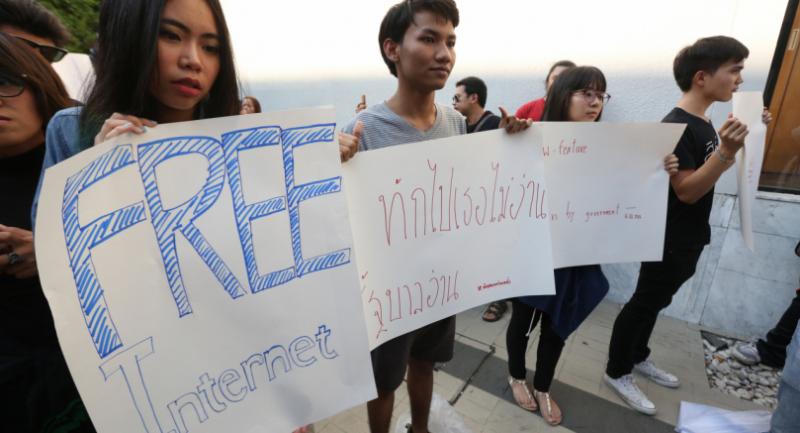Businesses back new law while students up in arms

ONLINE and digital businesses have expressed support for the new Computer Crime Act, as it will tackle the piracy issue more effectively, according to industry executives.
Meanwhile, a group of 10 university students representing the Free Internet Society of Thailand (Fist) yesterday joined forces at Bangkok’s Art and Culture Centre to oppose the new law, arguing that it violates the people’s rights.
Om-thip Palanun, a first-year Chulalongkorn University student, said the law would reduce people’s freedom of expression hence the National Legislative Assembly is urged to revoke the law as demanded by about 360,000 people who signed up against the legislation. Other students also held placards that said “Free Internet”, “Invasion of privacy” and “We say No to Internet censorship”.
However, online and digital business leaders have welcomed the law, even though some are cautious about its enforcement.
Vachara Aemavat, president of Thailand Tech Start-up Association, said that the law will better protect the interests of tech start-ups and other businesses, especially those in media and contents whose intellectual property rights have been often violated by pirates.
“Previously, we relied on the civil law but now the common law is also applied in the new legislation [in terms of screening contents on the Internet]. My only concern is about the screening committee whose members have been increased from five to nine. Who will be appointed and how will they work?”
Vachara said the new law would not prompt Thai tech start-ups to register their businesses in Singapore as speculated since operators in Thailand are subject to compliance with Thai law, regardless of where they are registered.
“There are people who understand the essential points of this new law and those who misunderstand. For tech start-ups, they are waiting for details on rules and regulations that will be issued to govern the online and digital businesses. However, Dr Pichet [Durongkaveroj], the new digital economy and society minister, is knowledgeable so we are not worried about enforcement of this law.
“Rules and regulations also have to take into account new tech applications such as Blockchain. However, I share the opinion that the general public will be hit by this law, especially those who use social media to post and share content. They should study the law in some detail or else they would be breaking the law unintentionally.”
Thanachart Lumnonda, director of IMC Institute, a Thai-based technology training and research firm; and president of the Association of Thailand ICT Industry (ATCI), said that the new Computer Crime Act is unlikely to impact foreign investment in Thailand as economic factors such as supply and demand are more decisive factors for investors.
“If there is a big market, Facebook, Google and the likes want to go there [even though there could be some legal restrictions as in China, which is a huge market]. If we’re not a big market, we have less bargaining power. The new computer crime law is not new as other countries such as China also have this law,” he said.
Pawoot Pongvitayapanu, president of Thai E-Commerce Association and founder and chief executive officer of Tarad.com, said that the new law requires a court approval to remove online content so there is a check-and-balance mechanism.
However, he said, people will have to exercise more caution when posting messages and content online as they would be held responsible under the new law. In other words, the law will require netizens to double-check the validity of content before posting and sharing.
Poomjit Sirawongprasert, president of Thai Hosting Service Providers Club, said that Internet service providers and other online service providers would have to shoulder an additional cost in complying with the new law. They are required to keep log files for two years instead of only one year while those providing disaster recovery or back-up sites will face a challenge if they cannot quickly remove content deemed inappropriate or illegal by Thai officials.
Poomjit said innocent users of social media could also be abused and there are not yet clear guidelines on the do’s and don’ts.
